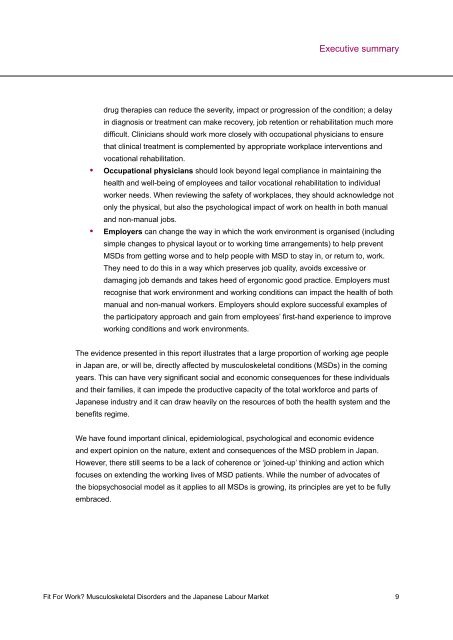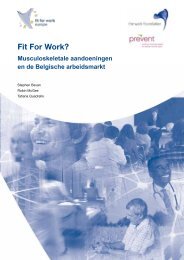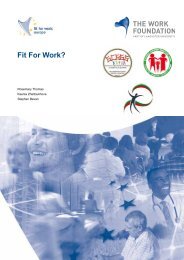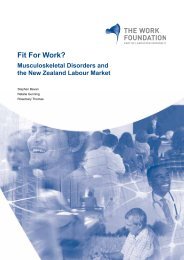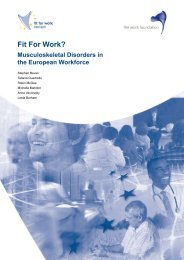English version - Fit for Work Europe
English version - Fit for Work Europe
English version - Fit for Work Europe
You also want an ePaper? Increase the reach of your titles
YUMPU automatically turns print PDFs into web optimized ePapers that Google loves.
Executive summary<br />
drug therapies can reduce the severity, impact or progression of the condition; a delay<br />
in diagnosis or treatment can make recovery, job retention or rehabilitation much more<br />
difficult. Clinicians should work more closely with occupational physicians to ensure<br />
that clinical treatment is complemented by appropriate workplace interventions and<br />
vocational rehabilitation.<br />
• Occupational physicians should look beyond legal compliance in maintaining the<br />
health and well-being of employees and tailor vocational rehabilitation to individual<br />
worker needs. When reviewing the safety of workplaces, they should acknowledge not<br />
only the physical, but also the psychological impact of work on health in both manual<br />
and non-manual jobs.<br />
• Employers can change the way in which the work environment is organised (including<br />
simple changes to physical layout or to working time arrangements) to help prevent<br />
MSDs from getting worse and to help people with MSD to stay in, or return to, work.<br />
They need to do this in a way which preserves job quality, avoids excessive or<br />
damaging job demands and takes heed of ergonomic good practice. Employers must<br />
recognise that work environment and working conditions can impact the health of both<br />
manual and non-manual workers. Employers should explore successful examples of<br />
the participatory approach and gain from employees’ first-hand experience to improve<br />
working conditions and work environments.<br />
The evidence presented in this report illustrates that a large proportion of working age people<br />
in Japan are, or will be, directly affected by musculoskeletal conditions (MSDs) in the coming<br />
years. This can have very significant social and economic consequences <strong>for</strong> these individuals<br />
and their families, it can impede the productive capacity of the total work<strong>for</strong>ce and parts of<br />
Japanese industry and it can draw heavily on the resources of both the health system and the<br />
benefits regime.<br />
We have found important clinical, epidemiological, psychological and economic evidence<br />
and expert opinion on the nature, extent and consequences of the MSD problem in Japan.<br />
However, there still seems to be a lack of coherence or ‘joined-up’ thinking and action which<br />
focuses on extending the working lives of MSD patients. While the number of advocates of<br />
the biopsychosocial model as it applies to all MSDs is growing, its principles are yet to be fully<br />
embraced.<br />
<strong>Fit</strong> For <strong>Work</strong>? Musculoskeletal Disorders and the Japanese Labour Market 9


